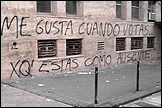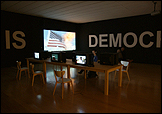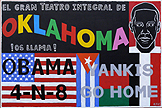Without
Reality There is No Utopia
Date: 14 April - 12 June
2011
Curators: Alicia Murría, Mariano Navarro and Juan Antonio Álvarez
Reyes
Exhibition Session: The Political Constitution of the Present
Ignasi Aballí
· Lene Berg · Fernando Bryce · William S. Burroughs
· Nikolay Oleynikov & Chto Delat? · Phil Collins ·
Dora García · Daniel García Andújar · Federico Guzmán
· Ed Hall · Jan Peter Hammer · Pello Irazu ·
Alfredo Jaar · Rogelio López Cuenca / Muntadas · Zeina
Maasri · Carlos Motta · Ciprian Muresan · Manolo
Quejido · Oliver Ressler · El Roto · Katya Sander
· Superflex · Wolfgang Tillmans · Rirkrit Tiravanija
· Judi Werthein · Zhou Xiaohu · Artur Żmijewski
What's behind Without Reality There is No Utopia, the title
of the main collective exhibition in The Political Constitution
of the Present cycle? Behind it are two philosophers of different
implications and relevance: Jean Baudrillard and Andreas Huyssen.
The former, with his theory of the replacement of the real by the
simulacrum, has ended up being perhaps the French philosopher of his
generation with the best approach to the analysis of the present,
at least for now. Baudrillard has pointed out that simulation is the
generation "of something real with no origin or reality". The dissolution
of the real in the virtual is not only a good diagnostic of the present,
but also a conclusion which demands to be, in turn, overcome. Thus,
the interpretation and meaning of Without Reality There is No Utopia
follows the argument of Andreas Huyssen in "Memories of Utopia", an
article published in Spanish in his book En busca del futuro perdido.
In stating that once the real has been lost and supplanted by the simulacrum, utopia can no longer exist, since it is intricately related to the superation and improvement of reality, Huyssen premises his argument on, precisely, Baudrillard. This is the meaning implied in the title of the exhibition: Without Reality There is No Utopia. That is to say, in the age of simulacra and virtuality, the disappearance of the real also drags along the utopian. This is why it is urgent and necessary to reset the real, to return to reality, or, at least, to its analysis, in order to attempt to apprehend a new utopian thought. The current situation demands it.
Without Reality There is No Utopia consists of two asymmetric sections.
The first section is "Description Of The Lie", a kind of incredulous prologue to the systems of production of the simulacra of the real. In that section, there are two pieces, two videos, which engage human scepticism and its current drift. On the one hand, we have William S. Burroughs, reciting Bertolt Brecht. On the other, Alfredo Jaar, who recovers the analysis on Pier Paolo Pasolini.
The second, broader section, is entitled "Collapses", although it could just as well have borrowed Baudrillard's term "Implosions", since contemporaneity can be described as an implosive situation. This second section is in turn divided into four collapses: the collapse of Communism, the collapse of Capitalism, that of democracy, and that of the geo-political. That is to say - according to Huyssen - "Utopia never dies alone: it drags along its counter-utopia." Therefore, the fall of Communism drags along its counter-utopia - Capitalism - which in turn drags along democracy, since the latter linked its destiny to it. The likely collapse of the expansive system typical of Capitalism - Colonialism - would, in turn, involve a geo-political "implosion". For these reasons, we should seriously consider the end of Utopia as "our problem", the problem of our times, since, as Huyssen points out, its scope "is much greater than we would like to admit". We should, therefore, urgently rethink and recalibrate the real, since, Without Reality There is No Utopia.
|
ADDITIONAL DOCUMENTATION |




